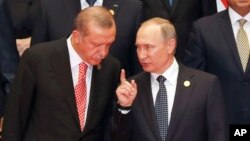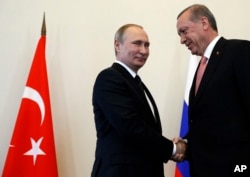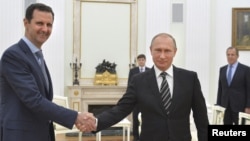Diplomatic efforts between Ankara and Moscow are likely to get a boost Monday when President Vladimir Putin visits Turkey, where he is scheduled to meet his Turkish counterpart Recep Tayyip Erdogan. Growing differences over Syria, however, as well as Turkey's moves to align itself closer to Saudi Arabia, threaten to overshadow Putin's visit.
Putin's attendance at the World Energy Congress in Istanbul is the latest effort to repair relations after Turkish jets shot down a Russian bomber operating from a Syrian air base in November.
"It is a follow-up visit of Erdogan’s visit to Saint Petersburg," said Murat Bilhan, deputy chair of the Ankara-based Turkish Asian Center for Strategic Studies. "While certain normalization [steps] have already taken place to get the relations back on track again, there will be some positive developments in Turkish-Russian relations after the meeting between Putin and Erdogan."
Those positive developments are predicted to involve energy cooperation. Turkey, a geographical bridge between Russia and Europe, has long been viewed by Moscow as an alternative route to Ukraine, for a gas pipeline to serve European markets. The pipeline project — called "Turkish Stream" — was frozen after the collapse in relations between Ankara and Moscow in November.
Seeking deals
Sinan Ulgen, a visiting scholar of Carnegie Europe, says Putin's Istanbul visit likely will see concrete steps to bring the countries closer together.
"There is an expectation that there will be an intra-governmental agreement on Turkish Stream on that occasion," he said, referring to a proposed natural gas pipeline that would connect the countries. "So there will be statements on furthering collaboration on energy."
But Ulgen warns that Putin's visit won’t be without its difficulties. "At the same time, there will be a discussion where Ankara and Moscow do not see eye to eye, in particular on Syria and possibly Iraq given the present developing situation there."
To facilitate closer ties with Moscow, Erdogan softened his Syrian policy, dropping the demand for the immediate removal of Syria's President Bashar al-Assad. Instead, he suggested Assad could remain in power during a transition period. Reportedly, Ankara also agreed to reduce its support to Syrian rebels.
Competing relationships
The Turkish President is again hardening his stance toward Damascus, though, in a move that coincides with deepening relations with Saudi Arabia.
"In Turkey's case, there is this juggling act, you cannot keep the balls up in the air, at all times," cautioned former senior Turkish diplomat Aydin Selcen, who served widely in the region. He notes that Ankara is increasingly pursuing contradictory policies.
"You cannot give covert support to Jihadi elements and have your way with Moscow," Selcen said.
Adding to Moscow's unease, Turkish forces fighting the Islamic State in Syria are continuing to move deeper into Syrian territory, in the face of Russian warnings to curtail its operation.
Analyst Ulgen argues there is no contradiction in Turkish foreign policy.
"I think there has been a normalization with Russia rather than a real, genuine rapprochement. Because a rapprochement would entail a convergence of views on Syria, and they don't and we don't see that happening," he said. "That was also the case before the downing of the Russian jet in November 2015, when the relationship was good, but nonetheless both sides had regional differences, where both sides almost agreed to disagree on Syria. I think that is almost the situation now, where both sides agree to disagree. So in that sense, Turkey's rapprochement with Saudi Arabia on Syria is not incompatible with the normalization with Russia."
Ankara-Riyadh connection
Ulgen also suggests Ankara's relationship with Riyadh is likely to deepen, as pressure from Russian-backed Syrian regime forces intensifies on rebels.
Adding further tensions with Moscow, many of the rebel groups supported by Turkey and Saudi Arabia are deemed terrorists by Russia. Such differences likely will be featured prominently in the discussion between Putin and Erdogan, according to regional expert Bilhan.
"The differences of opinion on Syria, these will be tried to be narrowed," Bilhan said, "although some radical reappraisal of the situation is not expected. But of course both countries need each other, because Russia's economy is not going well. The more needy one is Turkey. Turkey also needs friends and seems to be isolated."
Iraq, too, threatens to complicate Russian-Turkish relations. Baghdad, another regional ally of Moscow, is locked in a deepening row with Ankara over its refusal to withdraw its military forces from the Bashiqa base in Iraq.
Ankara is likely to be banking on the lure of lucrative commercial deals, particularly in the field of energy. Such an initiative would help lubricate efforts to resolve regional differences with Moscow, or at least compartmentalize them.
Observers underscore that with regional pressure building, and Moscow and Ankara on increasingly opposing sides, sustaining closer relations can only get more difficult.








